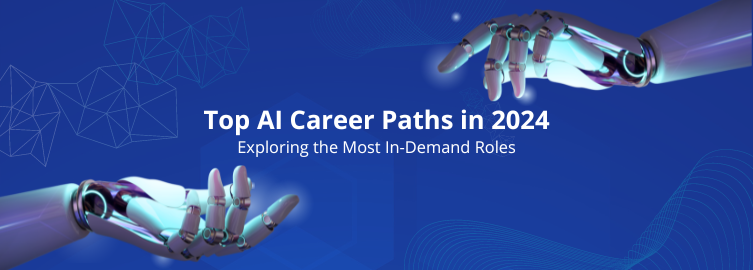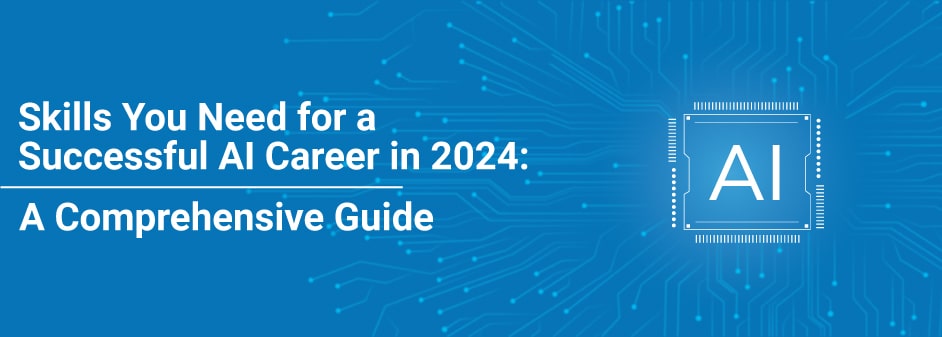Top AI Career Paths in 2024: Exploring the Most In-Demand Roles

As artificial intelligence (AI) continues to revolutionize industries across the globe, the demand for skilled professionals in this field is skyrocketing. If you’re looking for AI Career Paths in 2024, it offers an array of exciting opportunities. In this blog, we will explore the top AI career paths, highlighting the most in-demand roles and what you need to succeed in each one.
AI Researcher
Role Overview:
AI researchers are at the forefront of technological advancements, working on developing new algorithms, models, and applications. They often collaborate with academic institutions, research labs, and tech companies to push the boundaries of what AI can achieve.
Key Responsibilities:
- Conducting cutting-edge research in machine learning, deep learning, and other AI subfields.
- Publishing findings in scientific journals and presenting at conferences.
- Collaborating with cross-functional teams to apply research to real-world problems.
Skills Required:
- Strong background in mathematics, statistics, and computer science.
- Proficiency in programming languages such as Python, R, and Java.
- Experience with machine learning frameworks like TensorFlow and PyTorch.
Why It’s In-Demand:
The rapid pace of AI innovation requires constant research and development. Companies and institutions are investing heavily in AI research to stay competitive, making this role highly sought after.
Machine Learning Engineer
Role Overview:
Machine learning engineers design, build, and deploy machine learning models that can process and analyze vast amounts of data. They bridge the gap between data science and software engineering, ensuring that AI models are scalable and efficient.
Key Responsibilities:
- Developing and optimizing machine learning algorithms.
- Implementing models into production systems.
- Working with data scientists to refine models and improve accuracy.
Skills Required:
- Expertise in machine learning techniques and algorithms.
- Strong programming skills in languages like Python, C++, and Java.
- Knowledge of data processing frameworks such as Apache Spark and Hadoop.
Why It’s In-Demand:
As businesses increasingly rely on data-driven decision-making, the need for robust and scalable AI solutions grows. Machine learning engineers are crucial for turning theoretical models into practical applications.
Data Scientist
Role Overview:
Data scientists analyze and interpret complex data to help organizations make informed decisions. They utilize statistical methods, machine learning, and data visualization techniques to uncover insights and trends.
Key Responsibilities:
- Collecting, cleaning, and preprocessing data from various sources.
- Building predictive models and algorithms.
- Communicating findings to stakeholders through reports and visualizations.
Skills Required:
- Strong analytical and problem-solving skills.
- Proficiency in statistical analysis and data visualization tools (e.g., SQL, Tableau).
- Experience with machine learning libraries and frameworks.
Why It’s In-Demand:
The explosion of big data has made data science one of the most critical roles in any organization. Businesses need skilled data scientists to harness data’s power and gain a competitive edge.
AI Ethics Specialist
Role Overview:
AI ethics specialists ensure that AI systems are designed and implemented in a manner that is ethical, fair, and compliant with regulations. They address issues such as bias, privacy, and transparency in AI.
Key Responsibilities:
- Developing guidelines and policies for ethical AI use.
- Auditing AI systems for compliance with ethical standards.
- Educating stakeholders on ethical considerations and best practices.
Skills Required:
- Deep understanding of AI and its societal impacts.
- Knowledge of ethical theories and principles.
- Strong communication skills to advocate for ethical practices.
Why It’s In-Demand:
As AI becomes more pervasive, concerns about its ethical implications are growing. Organizations are increasingly aware of the need to implement AI responsibly, making AI ethics specialists essential.
Conclusion
The AI landscape in 2024 offers a wealth of opportunities for professionals with the right skills and knowledge. Whether you’re interested in pioneering research, building scalable models, analyzing data, or ensuring ethical AI practices, there is a rewarding career path waiting for you. By staying up-to-date with the latest trends and continuously developing your expertise, you can thrive in the dynamic and rapidly evolving field of AI.
As artificial intelligence (AI) continues to revolutionize industries across the globe, the demand for skilled professionals in this field is skyrocketing. If you’re looking for AI Career Paths in 2024, it offers an array of exciting opportunities. In this blog, we will explore the top AI career paths, highlighting the most in-demand roles and what you need to succeed in each one.
AI Researcher
Role Overview:
AI researchers are at the forefront of technological advancements, working on developing new algorithms, models, and applications. They often collaborate with academic institutions, research labs, and tech companies to push the boundaries of what AI can achieve.
Key Responsibilities:
- Conducting cutting-edge research in machine learning, deep learning, and other AI subfields.
- Publishing findings in scientific journals and presenting at conferences.
- Collaborating with cross-functional teams to apply research to real-world problems.
Skills Required:
- Strong background in mathematics, statistics, and computer science.
- Proficiency in programming languages such as Python, R, and Java.
- Experience with machine learning frameworks like TensorFlow and PyTorch.
Why It’s In-Demand:
The rapid pace of AI innovation requires constant research and development. Companies and institutions are investing heavily in AI research to stay competitive, making this role highly sought after.
Machine Learning Engineer
Role Overview:
Machine learning engineers design, build, and deploy machine learning models that can process and analyze vast amounts of data. They bridge the gap between data science and software engineering, ensuring that AI models are scalable and efficient.
Key Responsibilities:
- Developing and optimizing machine learning algorithms.
- Implementing models into production systems.
- Working with data scientists to refine models and improve accuracy.
Skills Required:
- Expertise in machine learning techniques and algorithms.
- Strong programming skills in languages like Python, C++, and Java.
- Knowledge of data processing frameworks such as Apache Spark and Hadoop.
Why It’s In-Demand:
As businesses increasingly rely on data-driven decision-making, the need for robust and scalable AI solutions grows. Machine learning engineers are crucial for turning theoretical models into practical applications.
Data Scientist
Role Overview:
Data scientists analyze and interpret complex data to help organizations make informed decisions. They utilize statistical methods, machine learning, and data visualization techniques to uncover insights and trends.
Key Responsibilities:
- Collecting, cleaning, and preprocessing data from various sources.
- Building predictive models and algorithms.
- Communicating findings to stakeholders through reports and visualizations.
Skills Required:
- Strong analytical and problem-solving skills.
- Proficiency in statistical analysis and data visualization tools (e.g., SQL, Tableau).
- Experience with machine learning libraries and frameworks.
Why It’s In-Demand:
The explosion of big data has made data science one of the most critical roles in any organization. Businesses need skilled data scientists to harness data’s power and gain a competitive edge.
AI Ethics Specialist
Role Overview:
AI ethics specialists ensure that AI systems are designed and implemented in a manner that is ethical, fair, and compliant with regulations. They address issues such as bias, privacy, and transparency in AI.
Key Responsibilities:
- Developing guidelines and policies for ethical AI use.
- Auditing AI systems for compliance with ethical standards.
- Educating stakeholders on ethical considerations and best practices.
Skills Required:
- Deep understanding of AI and its societal impacts.
- Knowledge of ethical theories and principles.
- Strong communication skills to advocate for ethical practices.
Why It’s In-Demand:
As AI becomes more pervasive, concerns about its ethical implications are growing. Organizations are increasingly aware of the need to implement AI responsibly, making AI ethics specialists essential.
Conclusion
The AI landscape in 2024 offers a wealth of opportunities for professionals with the right skills and knowledge. Whether you’re interested in pioneering research, building scalable models, analyzing data, or ensuring ethical AI practices, there is a rewarding career path waiting for you. By staying up-to-date with the latest trends and continuously developing your expertise, you can thrive in the dynamic and rapidly evolving field of AI.




























